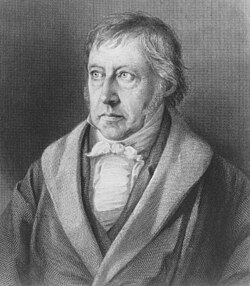Hegel
 From Wikiversity - Reading time: 3 min
From Wikiversity - Reading time: 3 min
< Back to the School of Philosophy
| “ | [I have seen the master composing with obscure and intricate signs, so that they could not be easily deciphered.] I often used to see him looking around anxiously as if in fear he might be understood. He was very fond of me, for he was sure I would never betray him. As a matter of fact, I then thought that he was very obsequious. Once, when I grew impatient with him for saying: 'All that is, is rational', he smiled strangely and remarked, 'it may also be said that all that is rational must be'. Then he looked about him hastily; but he was speedily reassured, for only Heinrich Beer had heard his words. (Heinrich Heine, cited in
McCarney, J: Hegel on History, ISBN 0-415-11695-3) |
” |
Georg Wilhelm Friedrich Hegel (1770–1831) has become notorious for the incredible obscurity of his writing. I am reading the back cover of Peter Singer's introduction to Hegel, where one can find a typical description of the non-specialist's impression.
Hegel has become a stock example of an obscure philosopher — a name to conjure with, but not someone whose work can be read and understood. Yet his importance is universally acknowledged, and we are still living in an intellectual climate decisively influenced by his ideas. (ISBN 0-19-287564-7)
However, it is probably best to read something written by Hegel to form your own opinion about his prose. A good place to start is the first couple of pages of the Introduction in the Phenomenology of Spirit.
Those who are not intimidated by the text face a further difficulty: Popular misconceptions or misleading caricatures of Hegel's work that abound even among academics unschooled in philosophy[1]. Despite being conspicuously debunked, these prejudices unjustly generate antipathy for Hegel's works. Crucial to the work of dispelling these myths has been Jon Stewart's The Hegel Myths and Legends (Jon Stewart, 1996) available at hegel.net and at marxists.org, which will be want to reviewed by neophytes of Hegel literature.
Essential Reading
[edit | edit source]Primary Sources
[edit | edit source]|
|
You can help expand this section with: additional primary sources worthy of neophyte. |
| No. | Title | Author | Date | External URL | ||||||
|---|---|---|---|---|---|---|---|---|---|---|
| 1 | Encyclopaedia of the Philosophical Sciences Introduction | Georg Wilhelm Friedrich Hegel | 1830 | marxists.org | ||||||
| Overview of Hegel's main philosophical aims, view of his relation to other philosophical figures. | ||||||||||
| 2 | The Spirit of Christianity and its Fate | Georg Wilhelm Friedrich Hegel | 1798 | marxists.org | ||||||
| Hegel's early theological application of his philosophical principles. | ||||||||||
Secondary Sources
[edit | edit source]|
|
You can help expand this section with: secondary sources worthy of neophyte. |
Commentaries
[edit | edit source]Biography
[edit | edit source]
Please consider the following articles:
- The Wikipedia entry for Hegel.
- Hegel's biography at marxists.org.
- Hegel's biography at hegel.net.
The Phenomenology of Spirit
[edit | edit source]The Phenomenology of Spirit (also translated as the Phenomenology of Mind) is widely acknowledged as one of Hegel's most significant contributions to philosophy (perhaps his most important work). It is a very interesting and complex book. The 1911 Encyclopædia Britannica article on Hegel included a heroic attempt to summarize the Phenomenology which gives an idea of the far reaching implications of the work, from metaphysics to ethics and political philosophy:
- http://hegel.net/en/eb1911.htm#31
- Wikisource: 1911 Encyclopædia Britannica/Hegel, Georg Wilhelm Friedrich
Bibliographies
[edit | edit source]- Andrew Chitty (University of Sussex, England) has written a huge Hegel bibliography.
- Wikipedia entry on Hegel.
Active participants
[edit | edit source]- ↑ Craig, E; Hoskin, M. (1992-08-03). "Hegel and the Seven Planets". articles.adsabs.harvard.edu. Retrieved 2020-07-30.
 KSF
KSF